Employability Report: PC-DE0310 Reflective Analysis and Action Plan
VerifiedAdded on 2023/01/23
|7
|1711
|80
Report
AI Summary
This employability report presents a reflective analysis of a student's personal development journey, focusing on the application of the Gibbs reflective cycle. The report details the student's experience with conducting research, including challenges faced during surveys and face-to-face interviews, and the associated feelings and evaluations. It highlights the student's initial lack of preparation and its impact on data collection and participant interactions. Through critical self-assessment, the student identifies the need to improve communication and interview skills, and develops an action plan to address these weaknesses. The report concludes with a summary of the learning process, emphasizing the importance of adaptability, supportive relationships, and continuous improvement through reflective practices to enhance employability and professional skills. The student also reflects on the importance of preparation and how to deal with unfamiliar situations.
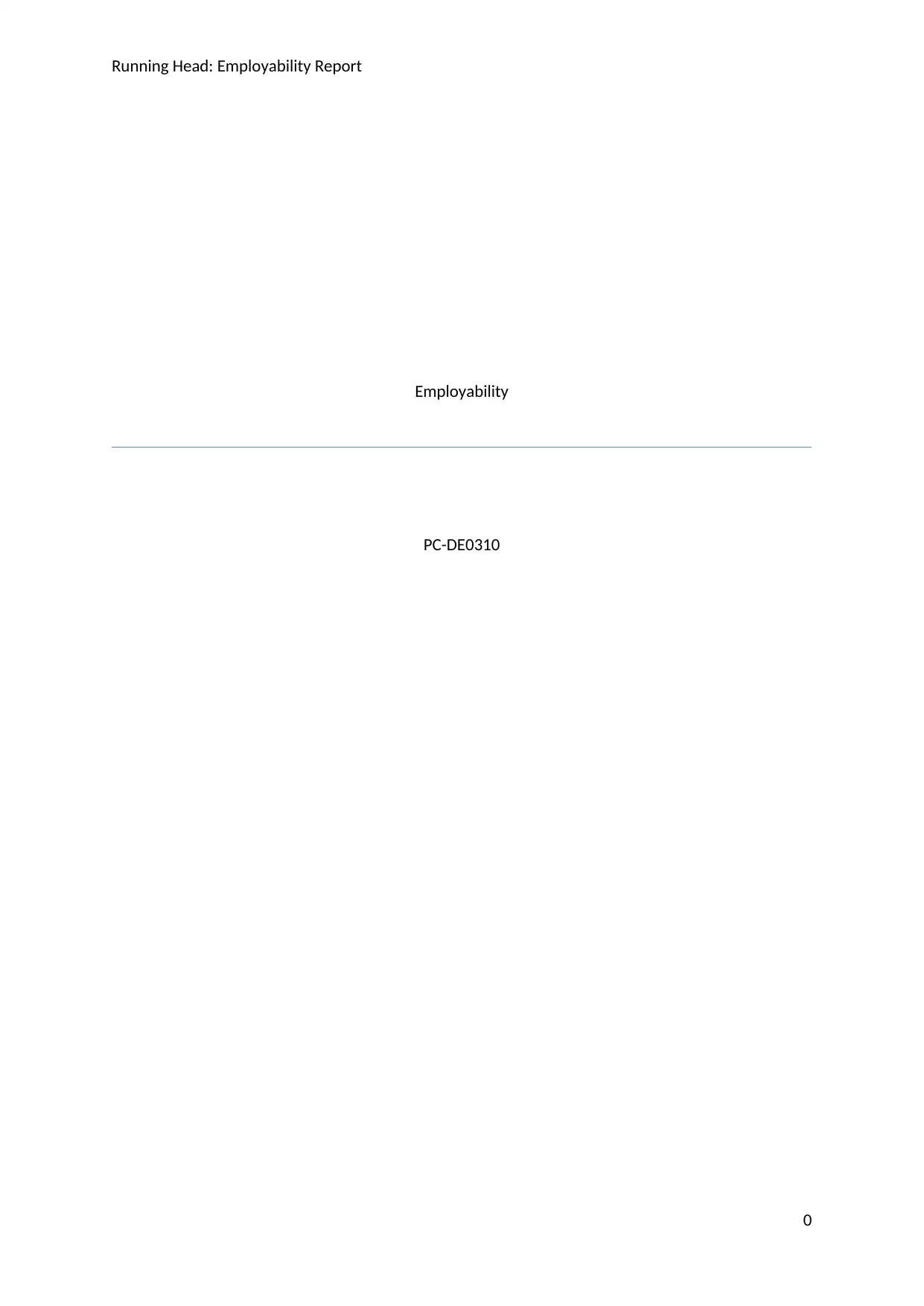
Running Head: Employability Report
Employability
PC-DE0310
0
Employability
PC-DE0310
0
Paraphrase This Document
Need a fresh take? Get an instant paraphrase of this document with our AI Paraphraser
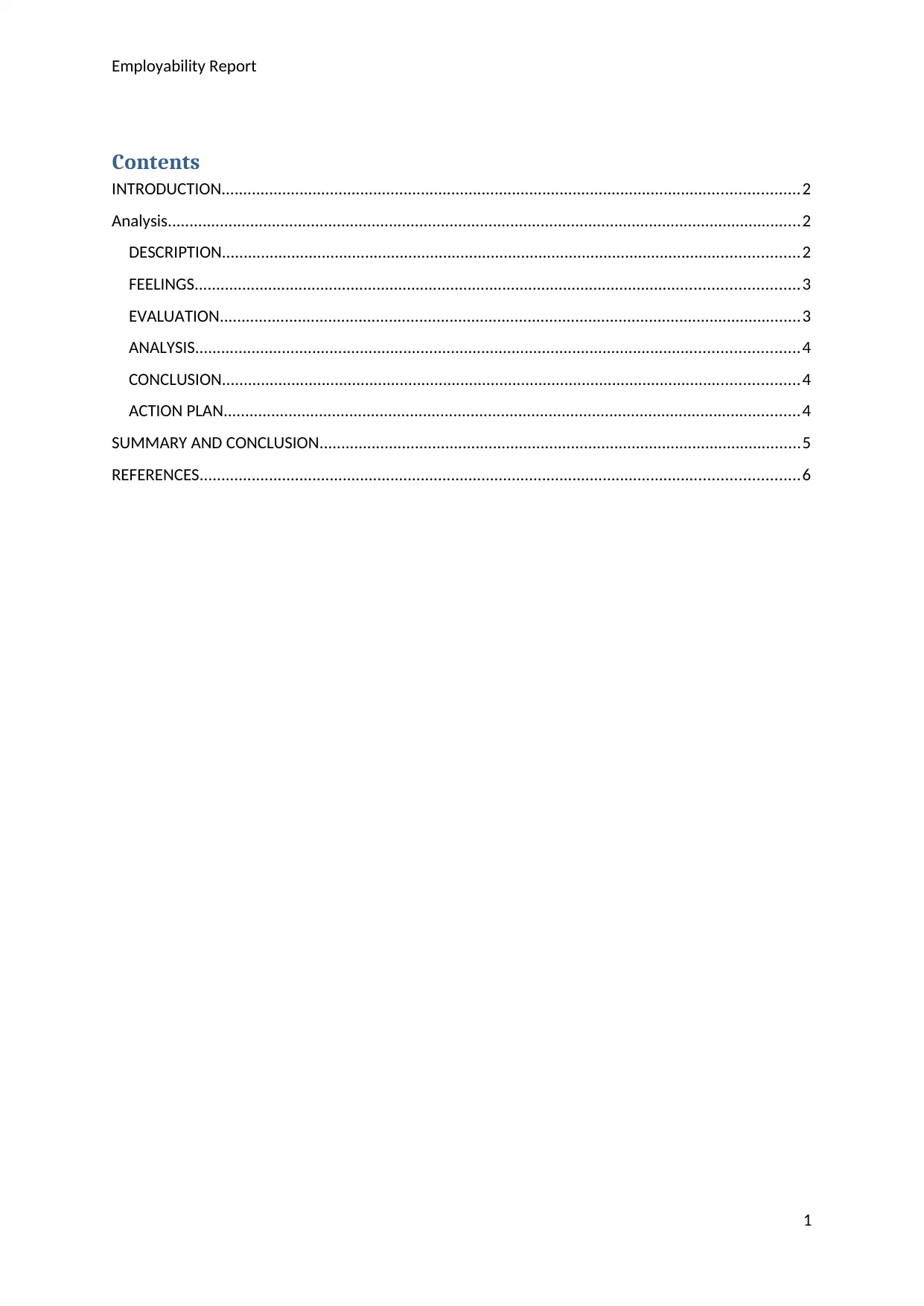
Employability Report
Contents
INTRODUCTION.....................................................................................................................................2
Analysis..................................................................................................................................................2
DESCRIPTION.....................................................................................................................................2
FEELINGS...........................................................................................................................................3
EVALUATION......................................................................................................................................3
ANALYSIS...........................................................................................................................................4
CONCLUSION.....................................................................................................................................4
ACTION PLAN.....................................................................................................................................4
SUMMARY AND CONCLUSION...............................................................................................................5
REFERENCES..........................................................................................................................................6
1
Contents
INTRODUCTION.....................................................................................................................................2
Analysis..................................................................................................................................................2
DESCRIPTION.....................................................................................................................................2
FEELINGS...........................................................................................................................................3
EVALUATION......................................................................................................................................3
ANALYSIS...........................................................................................................................................4
CONCLUSION.....................................................................................................................................4
ACTION PLAN.....................................................................................................................................4
SUMMARY AND CONCLUSION...............................................................................................................5
REFERENCES..........................................................................................................................................6
1
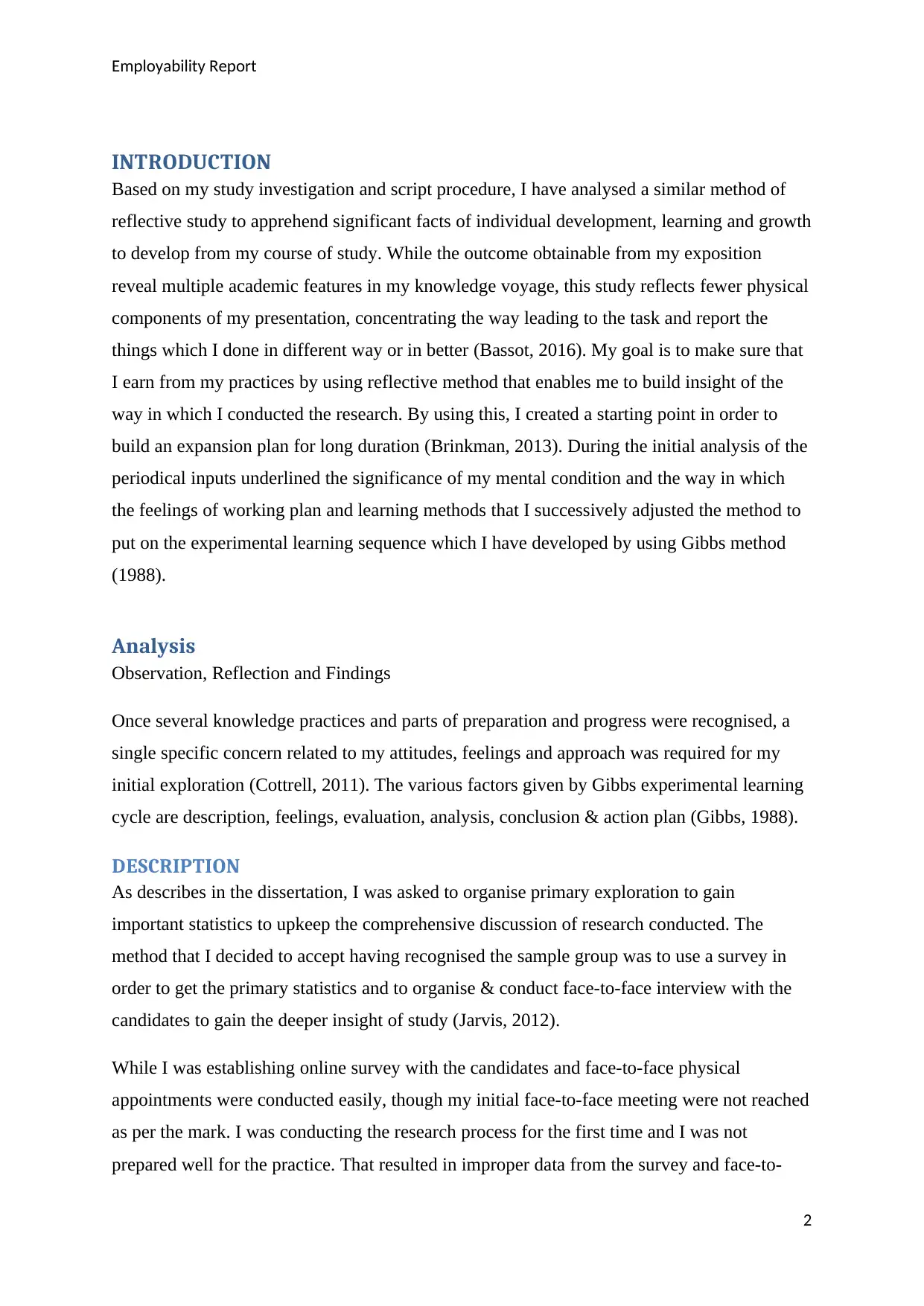
Employability Report
INTRODUCTION
Based on my study investigation and script procedure, I have analysed a similar method of
reflective study to apprehend significant facts of individual development, learning and growth
to develop from my course of study. While the outcome obtainable from my exposition
reveal multiple academic features in my knowledge voyage, this study reflects fewer physical
components of my presentation, concentrating the way leading to the task and report the
things which I done in different way or in better (Bassot, 2016). My goal is to make sure that
I earn from my practices by using reflective method that enables me to build insight of the
way in which I conducted the research. By using this, I created a starting point in order to
build an expansion plan for long duration (Brinkman, 2013). During the initial analysis of the
periodical inputs underlined the significance of my mental condition and the way in which
the feelings of working plan and learning methods that I successively adjusted the method to
put on the experimental learning sequence which I have developed by using Gibbs method
(1988).
Analysis
Observation, Reflection and Findings
Once several knowledge practices and parts of preparation and progress were recognised, a
single specific concern related to my attitudes, feelings and approach was required for my
initial exploration (Cottrell, 2011). The various factors given by Gibbs experimental learning
cycle are description, feelings, evaluation, analysis, conclusion & action plan (Gibbs, 1988).
DESCRIPTION
As describes in the dissertation, I was asked to organise primary exploration to gain
important statistics to upkeep the comprehensive discussion of research conducted. The
method that I decided to accept having recognised the sample group was to use a survey in
order to get the primary statistics and to organise & conduct face-to-face interview with the
candidates to gain the deeper insight of study (Jarvis, 2012).
While I was establishing online survey with the candidates and face-to-face physical
appointments were conducted easily, though my initial face-to-face meeting were not reached
as per the mark. I was conducting the research process for the first time and I was not
prepared well for the practice. That resulted in improper data from the survey and face-to-
2
INTRODUCTION
Based on my study investigation and script procedure, I have analysed a similar method of
reflective study to apprehend significant facts of individual development, learning and growth
to develop from my course of study. While the outcome obtainable from my exposition
reveal multiple academic features in my knowledge voyage, this study reflects fewer physical
components of my presentation, concentrating the way leading to the task and report the
things which I done in different way or in better (Bassot, 2016). My goal is to make sure that
I earn from my practices by using reflective method that enables me to build insight of the
way in which I conducted the research. By using this, I created a starting point in order to
build an expansion plan for long duration (Brinkman, 2013). During the initial analysis of the
periodical inputs underlined the significance of my mental condition and the way in which
the feelings of working plan and learning methods that I successively adjusted the method to
put on the experimental learning sequence which I have developed by using Gibbs method
(1988).
Analysis
Observation, Reflection and Findings
Once several knowledge practices and parts of preparation and progress were recognised, a
single specific concern related to my attitudes, feelings and approach was required for my
initial exploration (Cottrell, 2011). The various factors given by Gibbs experimental learning
cycle are description, feelings, evaluation, analysis, conclusion & action plan (Gibbs, 1988).
DESCRIPTION
As describes in the dissertation, I was asked to organise primary exploration to gain
important statistics to upkeep the comprehensive discussion of research conducted. The
method that I decided to accept having recognised the sample group was to use a survey in
order to get the primary statistics and to organise & conduct face-to-face interview with the
candidates to gain the deeper insight of study (Jarvis, 2012).
While I was establishing online survey with the candidates and face-to-face physical
appointments were conducted easily, though my initial face-to-face meeting were not reached
as per the mark. I was conducting the research process for the first time and I was not
prepared well for the practice. That resulted in improper data from the survey and face-to-
2
⊘ This is a preview!⊘
Do you want full access?
Subscribe today to unlock all pages.

Trusted by 1+ million students worldwide
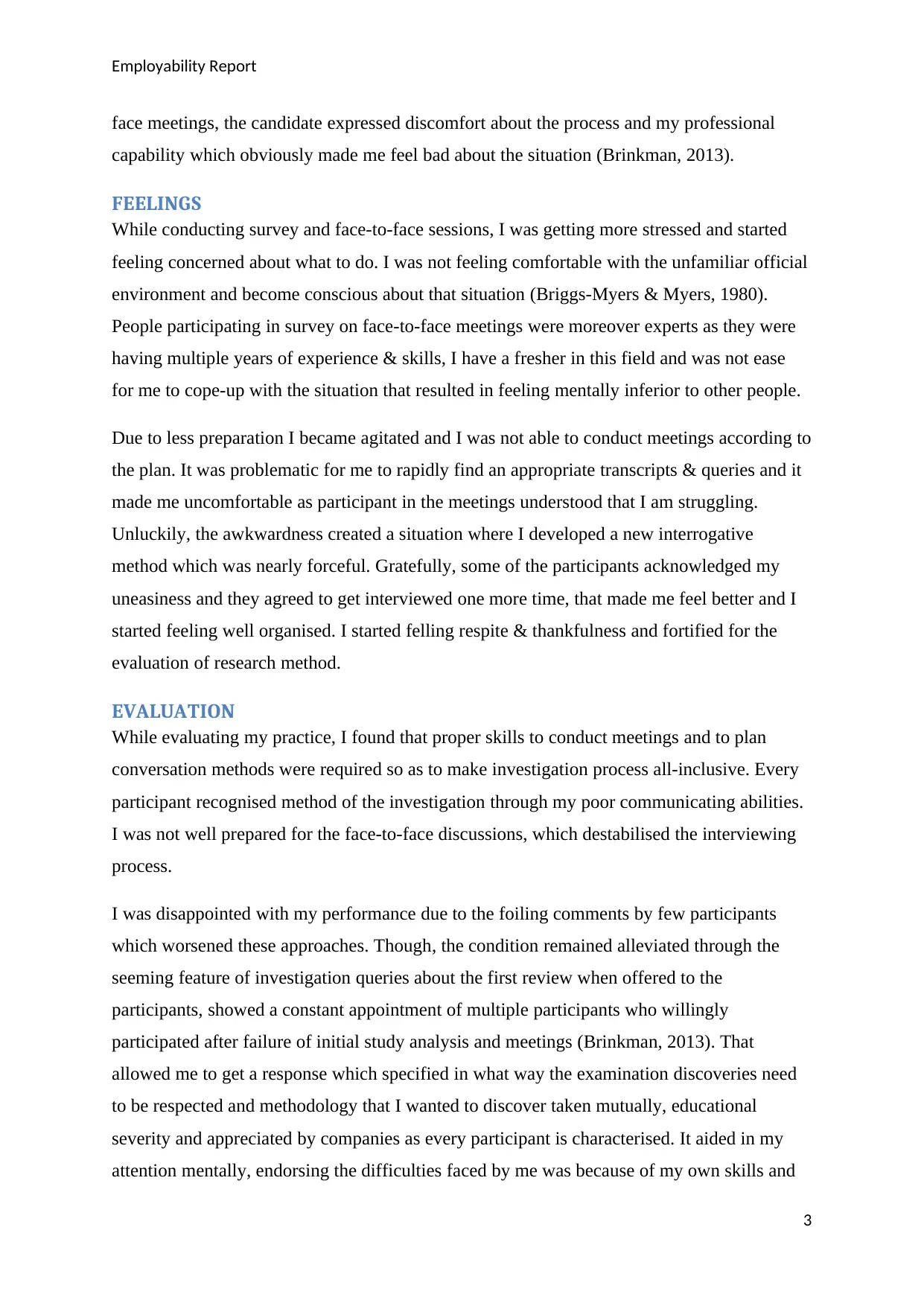
Employability Report
face meetings, the candidate expressed discomfort about the process and my professional
capability which obviously made me feel bad about the situation (Brinkman, 2013).
FEELINGS
While conducting survey and face-to-face sessions, I was getting more stressed and started
feeling concerned about what to do. I was not feeling comfortable with the unfamiliar official
environment and become conscious about that situation (Briggs-Myers & Myers, 1980).
People participating in survey on face-to-face meetings were moreover experts as they were
having multiple years of experience & skills, I have a fresher in this field and was not ease
for me to cope-up with the situation that resulted in feeling mentally inferior to other people.
Due to less preparation I became agitated and I was not able to conduct meetings according to
the plan. It was problematic for me to rapidly find an appropriate transcripts & queries and it
made me uncomfortable as participant in the meetings understood that I am struggling.
Unluckily, the awkwardness created a situation where I developed a new interrogative
method which was nearly forceful. Gratefully, some of the participants acknowledged my
uneasiness and they agreed to get interviewed one more time, that made me feel better and I
started feeling well organised. I started felling respite & thankfulness and fortified for the
evaluation of research method.
EVALUATION
While evaluating my practice, I found that proper skills to conduct meetings and to plan
conversation methods were required so as to make investigation process all-inclusive. Every
participant recognised method of the investigation through my poor communicating abilities.
I was not well prepared for the face-to-face discussions, which destabilised the interviewing
process.
I was disappointed with my performance due to the foiling comments by few participants
which worsened these approaches. Though, the condition remained alleviated through the
seeming feature of investigation queries about the first review when offered to the
participants, showed a constant appointment of multiple participants who willingly
participated after failure of initial study analysis and meetings (Brinkman, 2013). That
allowed me to get a response which specified in what way the examination discoveries need
to be respected and methodology that I wanted to discover taken mutually, educational
severity and appreciated by companies as every participant is characterised. It aided in my
attention mentally, endorsing the difficulties faced by me was because of my own skills and
3
face meetings, the candidate expressed discomfort about the process and my professional
capability which obviously made me feel bad about the situation (Brinkman, 2013).
FEELINGS
While conducting survey and face-to-face sessions, I was getting more stressed and started
feeling concerned about what to do. I was not feeling comfortable with the unfamiliar official
environment and become conscious about that situation (Briggs-Myers & Myers, 1980).
People participating in survey on face-to-face meetings were moreover experts as they were
having multiple years of experience & skills, I have a fresher in this field and was not ease
for me to cope-up with the situation that resulted in feeling mentally inferior to other people.
Due to less preparation I became agitated and I was not able to conduct meetings according to
the plan. It was problematic for me to rapidly find an appropriate transcripts & queries and it
made me uncomfortable as participant in the meetings understood that I am struggling.
Unluckily, the awkwardness created a situation where I developed a new interrogative
method which was nearly forceful. Gratefully, some of the participants acknowledged my
uneasiness and they agreed to get interviewed one more time, that made me feel better and I
started feeling well organised. I started felling respite & thankfulness and fortified for the
evaluation of research method.
EVALUATION
While evaluating my practice, I found that proper skills to conduct meetings and to plan
conversation methods were required so as to make investigation process all-inclusive. Every
participant recognised method of the investigation through my poor communicating abilities.
I was not well prepared for the face-to-face discussions, which destabilised the interviewing
process.
I was disappointed with my performance due to the foiling comments by few participants
which worsened these approaches. Though, the condition remained alleviated through the
seeming feature of investigation queries about the first review when offered to the
participants, showed a constant appointment of multiple participants who willingly
participated after failure of initial study analysis and meetings (Brinkman, 2013). That
allowed me to get a response which specified in what way the examination discoveries need
to be respected and methodology that I wanted to discover taken mutually, educational
severity and appreciated by companies as every participant is characterised. It aided in my
attention mentally, endorsing the difficulties faced by me was because of my own skills and
3
Paraphrase This Document
Need a fresh take? Get an instant paraphrase of this document with our AI Paraphraser
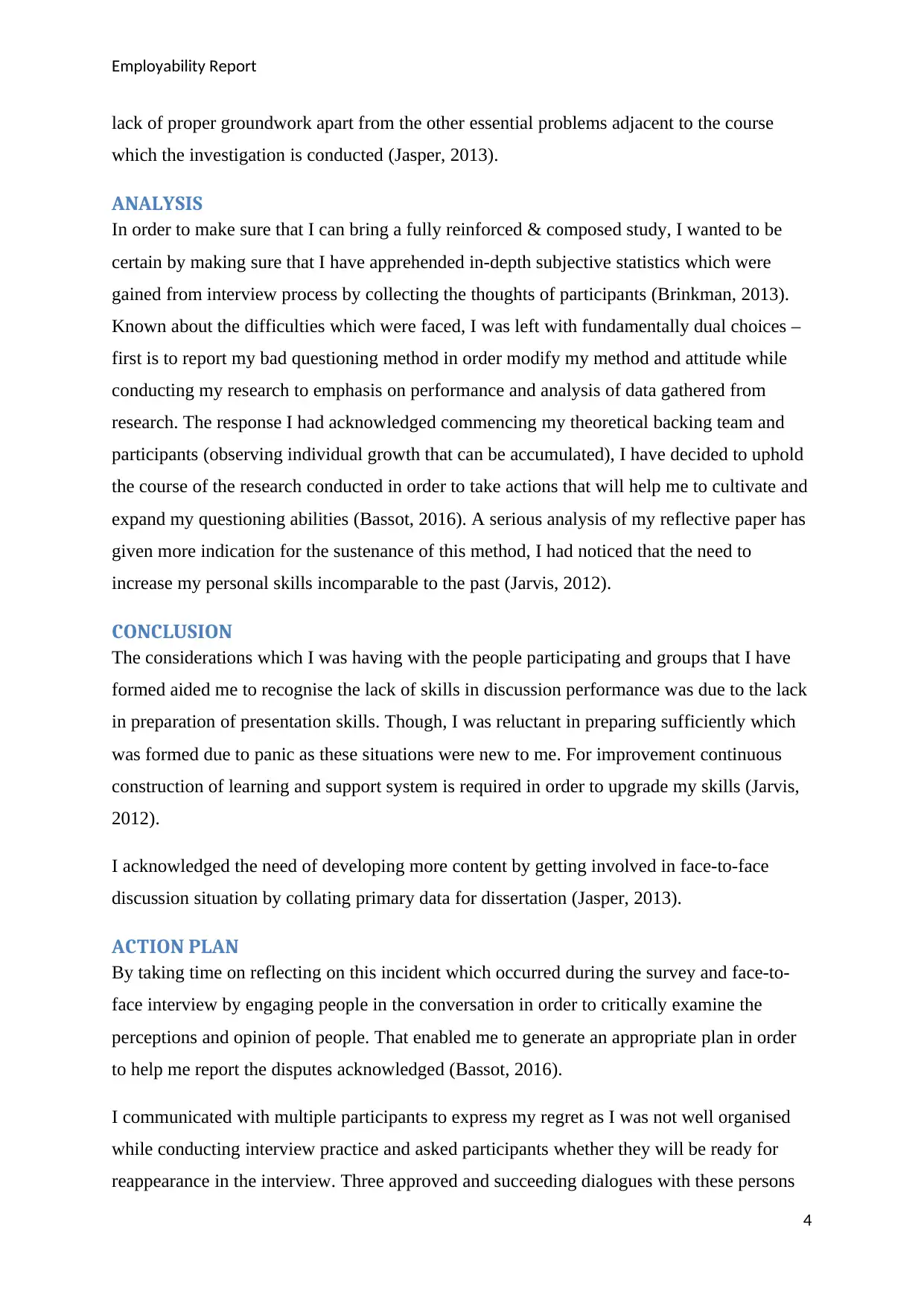
Employability Report
lack of proper groundwork apart from the other essential problems adjacent to the course
which the investigation is conducted (Jasper, 2013).
ANALYSIS
In order to make sure that I can bring a fully reinforced & composed study, I wanted to be
certain by making sure that I have apprehended in-depth subjective statistics which were
gained from interview process by collecting the thoughts of participants (Brinkman, 2013).
Known about the difficulties which were faced, I was left with fundamentally dual choices –
first is to report my bad questioning method in order modify my method and attitude while
conducting my research to emphasis on performance and analysis of data gathered from
research. The response I had acknowledged commencing my theoretical backing team and
participants (observing individual growth that can be accumulated), I have decided to uphold
the course of the research conducted in order to take actions that will help me to cultivate and
expand my questioning abilities (Bassot, 2016). A serious analysis of my reflective paper has
given more indication for the sustenance of this method, I had noticed that the need to
increase my personal skills incomparable to the past (Jarvis, 2012).
CONCLUSION
The considerations which I was having with the people participating and groups that I have
formed aided me to recognise the lack of skills in discussion performance was due to the lack
in preparation of presentation skills. Though, I was reluctant in preparing sufficiently which
was formed due to panic as these situations were new to me. For improvement continuous
construction of learning and support system is required in order to upgrade my skills (Jarvis,
2012).
I acknowledged the need of developing more content by getting involved in face-to-face
discussion situation by collating primary data for dissertation (Jasper, 2013).
ACTION PLAN
By taking time on reflecting on this incident which occurred during the survey and face-to-
face interview by engaging people in the conversation in order to critically examine the
perceptions and opinion of people. That enabled me to generate an appropriate plan in order
to help me report the disputes acknowledged (Bassot, 2016).
I communicated with multiple participants to express my regret as I was not well organised
while conducting interview practice and asked participants whether they will be ready for
reappearance in the interview. Three approved and succeeding dialogues with these persons
4
lack of proper groundwork apart from the other essential problems adjacent to the course
which the investigation is conducted (Jasper, 2013).
ANALYSIS
In order to make sure that I can bring a fully reinforced & composed study, I wanted to be
certain by making sure that I have apprehended in-depth subjective statistics which were
gained from interview process by collecting the thoughts of participants (Brinkman, 2013).
Known about the difficulties which were faced, I was left with fundamentally dual choices –
first is to report my bad questioning method in order modify my method and attitude while
conducting my research to emphasis on performance and analysis of data gathered from
research. The response I had acknowledged commencing my theoretical backing team and
participants (observing individual growth that can be accumulated), I have decided to uphold
the course of the research conducted in order to take actions that will help me to cultivate and
expand my questioning abilities (Bassot, 2016). A serious analysis of my reflective paper has
given more indication for the sustenance of this method, I had noticed that the need to
increase my personal skills incomparable to the past (Jarvis, 2012).
CONCLUSION
The considerations which I was having with the people participating and groups that I have
formed aided me to recognise the lack of skills in discussion performance was due to the lack
in preparation of presentation skills. Though, I was reluctant in preparing sufficiently which
was formed due to panic as these situations were new to me. For improvement continuous
construction of learning and support system is required in order to upgrade my skills (Jarvis,
2012).
I acknowledged the need of developing more content by getting involved in face-to-face
discussion situation by collating primary data for dissertation (Jasper, 2013).
ACTION PLAN
By taking time on reflecting on this incident which occurred during the survey and face-to-
face interview by engaging people in the conversation in order to critically examine the
perceptions and opinion of people. That enabled me to generate an appropriate plan in order
to help me report the disputes acknowledged (Bassot, 2016).
I communicated with multiple participants to express my regret as I was not well organised
while conducting interview practice and asked participants whether they will be ready for
reappearance in the interview. Three approved and succeeding dialogues with these persons
4
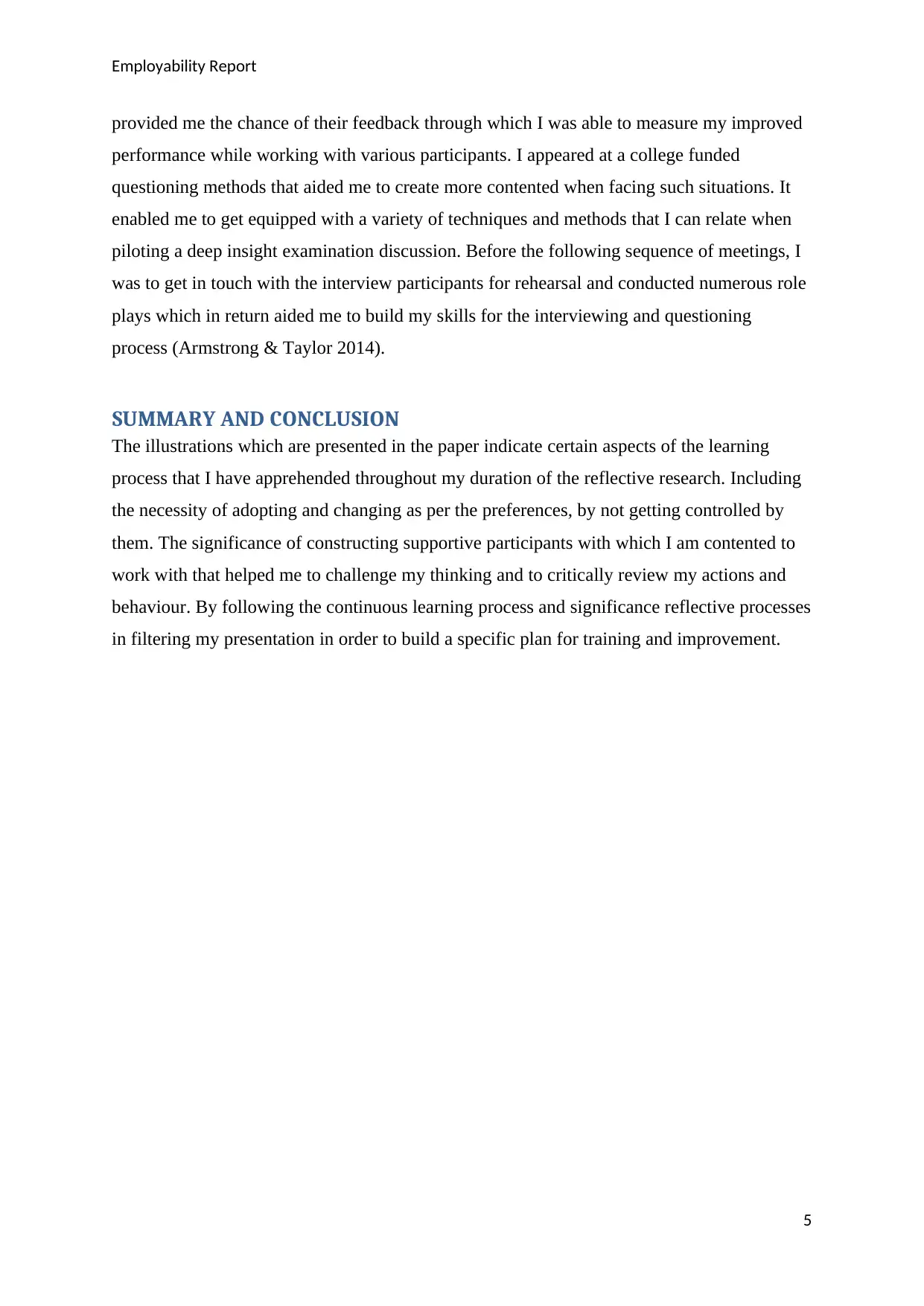
Employability Report
provided me the chance of their feedback through which I was able to measure my improved
performance while working with various participants. I appeared at a college funded
questioning methods that aided me to create more contented when facing such situations. It
enabled me to get equipped with a variety of techniques and methods that I can relate when
piloting a deep insight examination discussion. Before the following sequence of meetings, I
was to get in touch with the interview participants for rehearsal and conducted numerous role
plays which in return aided me to build my skills for the interviewing and questioning
process (Armstrong & Taylor 2014).
SUMMARY AND CONCLUSION
The illustrations which are presented in the paper indicate certain aspects of the learning
process that I have apprehended throughout my duration of the reflective research. Including
the necessity of adopting and changing as per the preferences, by not getting controlled by
them. The significance of constructing supportive participants with which I am contented to
work with that helped me to challenge my thinking and to critically review my actions and
behaviour. By following the continuous learning process and significance reflective processes
in filtering my presentation in order to build a specific plan for training and improvement.
5
provided me the chance of their feedback through which I was able to measure my improved
performance while working with various participants. I appeared at a college funded
questioning methods that aided me to create more contented when facing such situations. It
enabled me to get equipped with a variety of techniques and methods that I can relate when
piloting a deep insight examination discussion. Before the following sequence of meetings, I
was to get in touch with the interview participants for rehearsal and conducted numerous role
plays which in return aided me to build my skills for the interviewing and questioning
process (Armstrong & Taylor 2014).
SUMMARY AND CONCLUSION
The illustrations which are presented in the paper indicate certain aspects of the learning
process that I have apprehended throughout my duration of the reflective research. Including
the necessity of adopting and changing as per the preferences, by not getting controlled by
them. The significance of constructing supportive participants with which I am contented to
work with that helped me to challenge my thinking and to critically review my actions and
behaviour. By following the continuous learning process and significance reflective processes
in filtering my presentation in order to build a specific plan for training and improvement.
5
⊘ This is a preview!⊘
Do you want full access?
Subscribe today to unlock all pages.

Trusted by 1+ million students worldwide
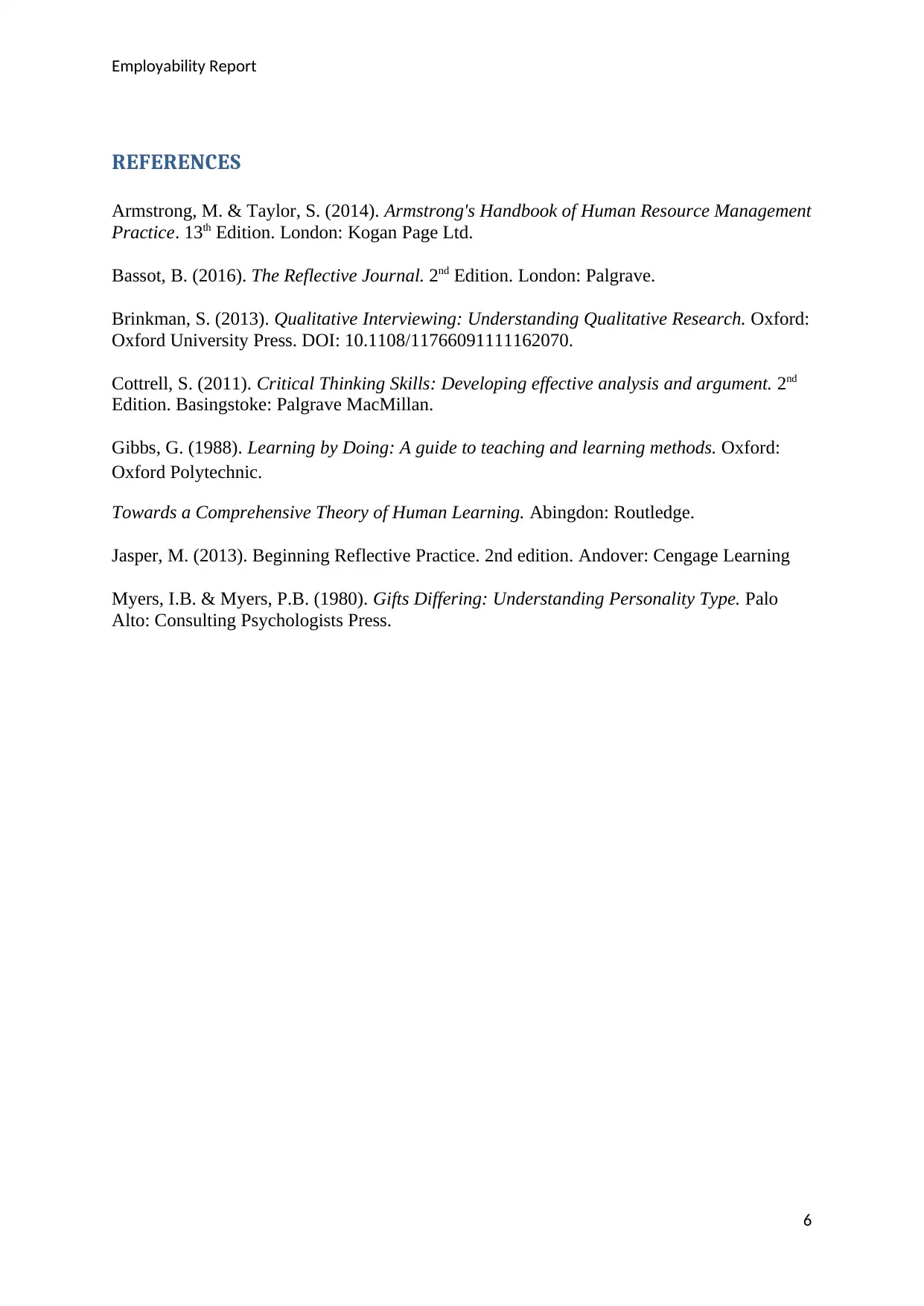
Employability Report
REFERENCES
Armstrong, M. & Taylor, S. (2014). Armstrong's Handbook of Human Resource Management
Practice. 13th Edition. London: Kogan Page Ltd.
Bassot, B. (2016). The Reflective Journal. 2nd Edition. London: Palgrave.
Brinkman, S. (2013). Qualitative Interviewing: Understanding Qualitative Research. Oxford:
Oxford University Press. DOI: 10.1108/11766091111162070.
Cottrell, S. (2011). Critical Thinking Skills: Developing effective analysis and argument. 2nd
Edition. Basingstoke: Palgrave MacMillan.
Gibbs, G. (1988). Learning by Doing: A guide to teaching and learning methods. Oxford:
Oxford Polytechnic.
Towards a Comprehensive Theory of Human Learning. Abingdon: Routledge.
Jasper, M. (2013). Beginning Reflective Practice. 2nd edition. Andover: Cengage Learning
Myers, I.B. & Myers, P.B. (1980). Gifts Differing: Understanding Personality Type. Palo
Alto: Consulting Psychologists Press.
6
REFERENCES
Armstrong, M. & Taylor, S. (2014). Armstrong's Handbook of Human Resource Management
Practice. 13th Edition. London: Kogan Page Ltd.
Bassot, B. (2016). The Reflective Journal. 2nd Edition. London: Palgrave.
Brinkman, S. (2013). Qualitative Interviewing: Understanding Qualitative Research. Oxford:
Oxford University Press. DOI: 10.1108/11766091111162070.
Cottrell, S. (2011). Critical Thinking Skills: Developing effective analysis and argument. 2nd
Edition. Basingstoke: Palgrave MacMillan.
Gibbs, G. (1988). Learning by Doing: A guide to teaching and learning methods. Oxford:
Oxford Polytechnic.
Towards a Comprehensive Theory of Human Learning. Abingdon: Routledge.
Jasper, M. (2013). Beginning Reflective Practice. 2nd edition. Andover: Cengage Learning
Myers, I.B. & Myers, P.B. (1980). Gifts Differing: Understanding Personality Type. Palo
Alto: Consulting Psychologists Press.
6
1 out of 7
Related Documents
Your All-in-One AI-Powered Toolkit for Academic Success.
+13062052269
info@desklib.com
Available 24*7 on WhatsApp / Email
![[object Object]](/_next/static/media/star-bottom.7253800d.svg)
Unlock your academic potential
Copyright © 2020–2026 A2Z Services. All Rights Reserved. Developed and managed by ZUCOL.



